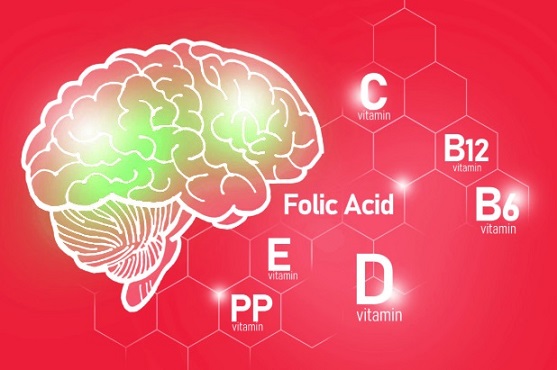The Role of Vitamins in Protecting the Brain and Slowing Neurodegenerative Diseases
Nikhil Prasad Fact checked by:Thailand Medical News Team Feb 11, 2025 2 months, 2 days, 5 hours, 33 minutes ago
Medical News: A New Look at Vitamins and Brain Health
Researchers from the Medical University of Bialystok and the Institute of Plant Protection in Poland have found compelling evidence that vitamins play a crucial role in protecting the brain from neurodegenerative diseases. Their study highlights how essential vitamins such as B-complex, C, D, E, A, and K help maintain cognitive function and protect nerve cells from damage.
 The Role of Vitamins in Protecting the Brain and Slowing Neurodegenerative Diseases
The Role of Vitamins in Protecting the Brain and Slowing Neurodegenerative Diseases
Neurodegenerative diseases like Alzheimer’s, Parkinson’s, and multiple sclerosis result in the gradual breakdown of nerve cells, leading to cognitive decline, memory loss, and motor dysfunction. Scientists are increasingly looking at nutrition, particularly vitamins, as a way to slow down these diseases and possibly prevent them altogether. This
Medical News report explores their findings in detail.
How Vitamins Support Brain Function
The research emphasizes that vitamins are not just beneficial for overall health but are particularly vital for brain function. Each vitamin plays a specific role in maintaining neuronal health and preventing cognitive decline:
-B Vitamins: The B-complex group, including B1 (thiamine), B2 (riboflavin), B3 (niacin), B6 (pyridoxine), B7 (biotin), B9 (folate), and B12 (cobalamin), are essential for nerve function, energy metabolism, and neurotransmitter production. Deficiencies in B vitamins have been linked to memory problems, increased inflammation, and neuron damage in conditions such as Alzheimer’s and Parkinson’s.
-Vitamin C: A powerful antioxidant, vitamin C helps protect brain cells from oxidative stress and supports neurotransmitter production. It also plays a role in reducing amyloid plaque buildup, a key factor in Alzheimer’s disease.
-Vitamin D: This vitamin supports neuronal survival and reduces inflammation in the brain. Studies have shown that adequate levels of vitamin D can improve cognitive function and lower the risk of neurodegenerative disorders.
-Vitamin E: Known for its antioxidant properties, vitamin E helps prevent neuron damage and reduces inflammation. It has been linked to a lower risk of developing Parkinson’s disease and may slow down cognitive decline in Alzheimer’s patients.
-Vitamin A: Essential for brain plasticity and immune function, vitamin A plays a role in reducing beta-amyloid plaques and supporting dopamine production, which can help protect against Alzheimer’s and Parkinson’s.
-Vitamin K: This vitamin is involved in sphingolipid metabolism, a process critical for brain cell communication. It also has anti-inflammatory properties and may help prevent cognitive decline and neuron damage.
ong>Study Findings on Vitamin Deficiencies and Disease Progression
The researchers found that deficiencies in these vitamins can accelerate neurodegeneration. For example, low levels of vitamin B12 have been associated with increased brain atrophy, while vitamin D deficiency has been linked to a higher risk of developing dementia. The study also suggests that adequate vitamin intake can not only protect the brain but also slow down the progression of diseases in patients already diagnosed with neurodegenerative conditions.
-Vitamin A: Shown to improve cognitive deficits in Alzheimer’s patients
-Vitamin D: Enhances cognitive performance and reduces Alzheimer’s-related biomarkers
-Vitamin E: Lowers the risk of Parkinson’s disease and protects dopaminergic neurons
-B Vitamin Complex (B3, B6, B12, and Folate): Improves cognitive function and reduces inflammatory factors
-Vitamin C: Helps decrease amyloid plaque buildup and protects brain cells
-Vitamin K: Plays a crucial role in preventing neuronal deterioration and cognitive loss
The Future of Vitamin-Based Therapies
The study suggests that increasing vitamin intake through diet or supplementation could become a potential strategy for managing and preventing neurodegenerative diseases. However, researchers also emphasize the need for further studies to determine optimal dosages and personalized approaches, as vitamin metabolism varies from person to person.
While some may see vitamin supplementation as an added expense, the potential benefits - such as improving quality of life, reducing healthcare costs, and slowing disease progression - make it an area of great interest for future research. More scientific evidence could also lead to new regulations allowing for broader health claims linking vitamins to brain health.
Conclusion
Vitamins play a crucial role in maintaining brain health and protecting against neurodegenerative diseases. B vitamins, C, D, E, A, and K contribute to cognitive function, reduce oxidative stress, and support neuron survival. While vitamin deficiencies can accelerate neurodegeneration, proper supplementation has shown promise in slowing disease progression and improving symptoms in patients with conditions such as Alzheimer’s and Parkinson’s. Future research may lead to more personalized vitamin-based treatments, offering new hope for those at risk or already affected by these devastating diseases.
The study findings were published in the peer-reviewed: International Journal of Molecular Sciences.
https://www.mdpi.com/1422-0067/26/3/1333
For the latest on Brain Health and Vitamins, keep on logging to Thailand Medical News.
Read Also:
https://www.thailandmedical.news/news/medical-researchers-from-ohio-find-that-vitamin-k2-and-d3-can-help-provide-relief-for-long-covid
https://www.thailandmedical.news/news/high-dose-vitamin-c-as-a-potential-ally-against-tendon-cell-degeneration
https://www.thailandmedical.news/news/thiamine-deficiency-in-emergency-oncology-patients
